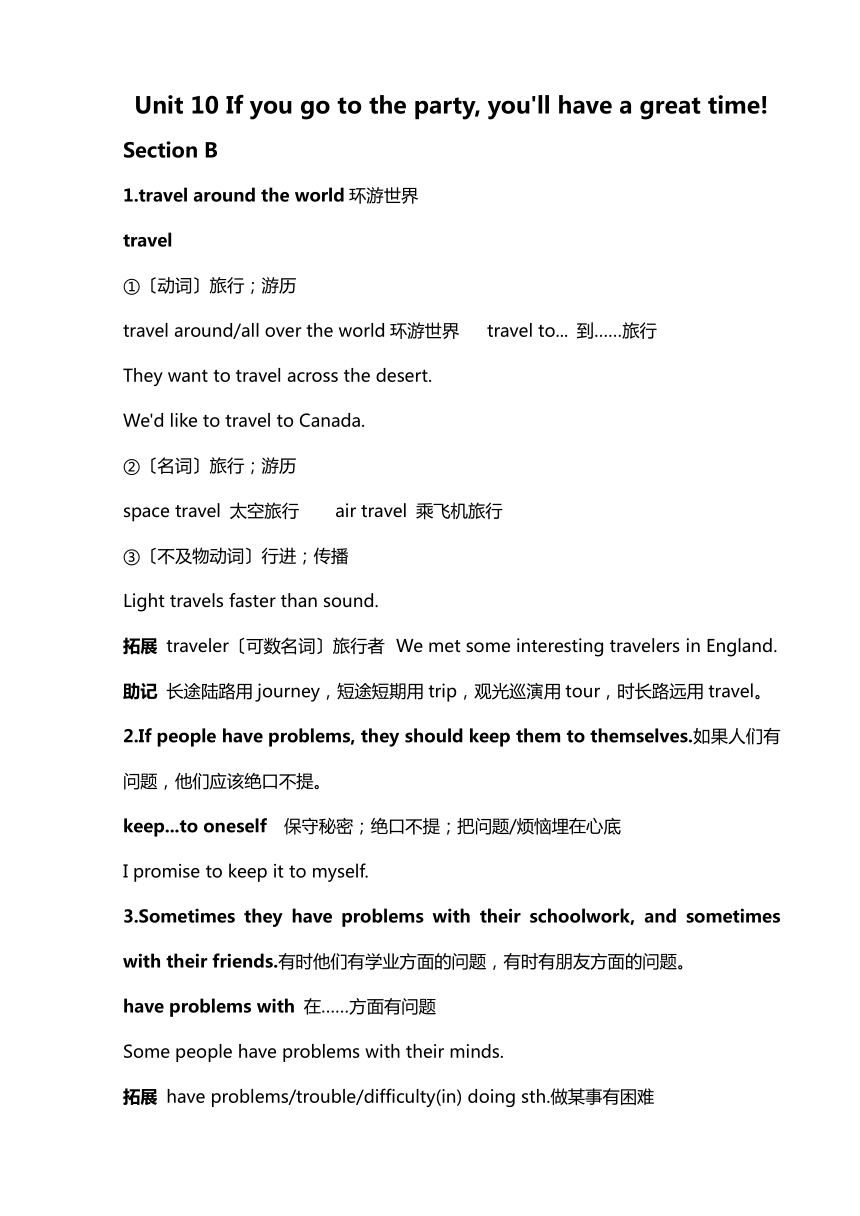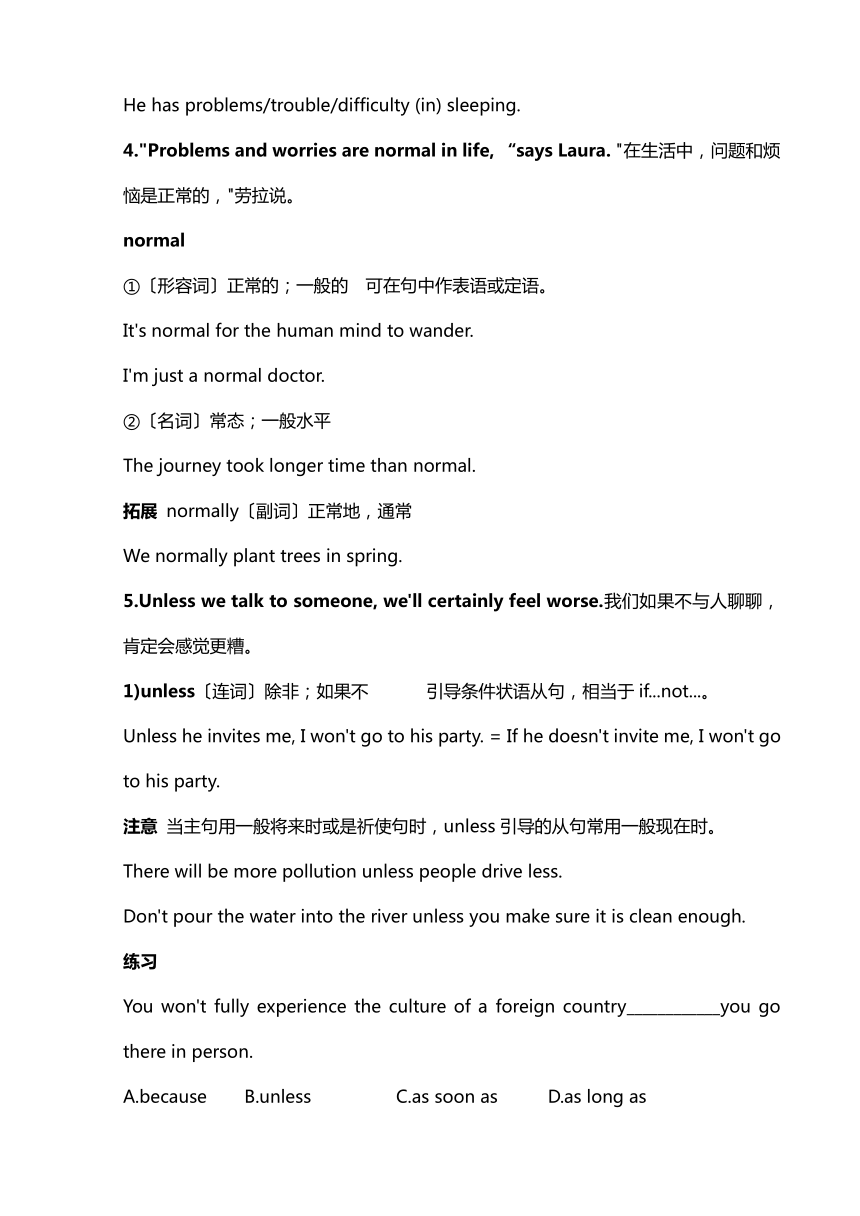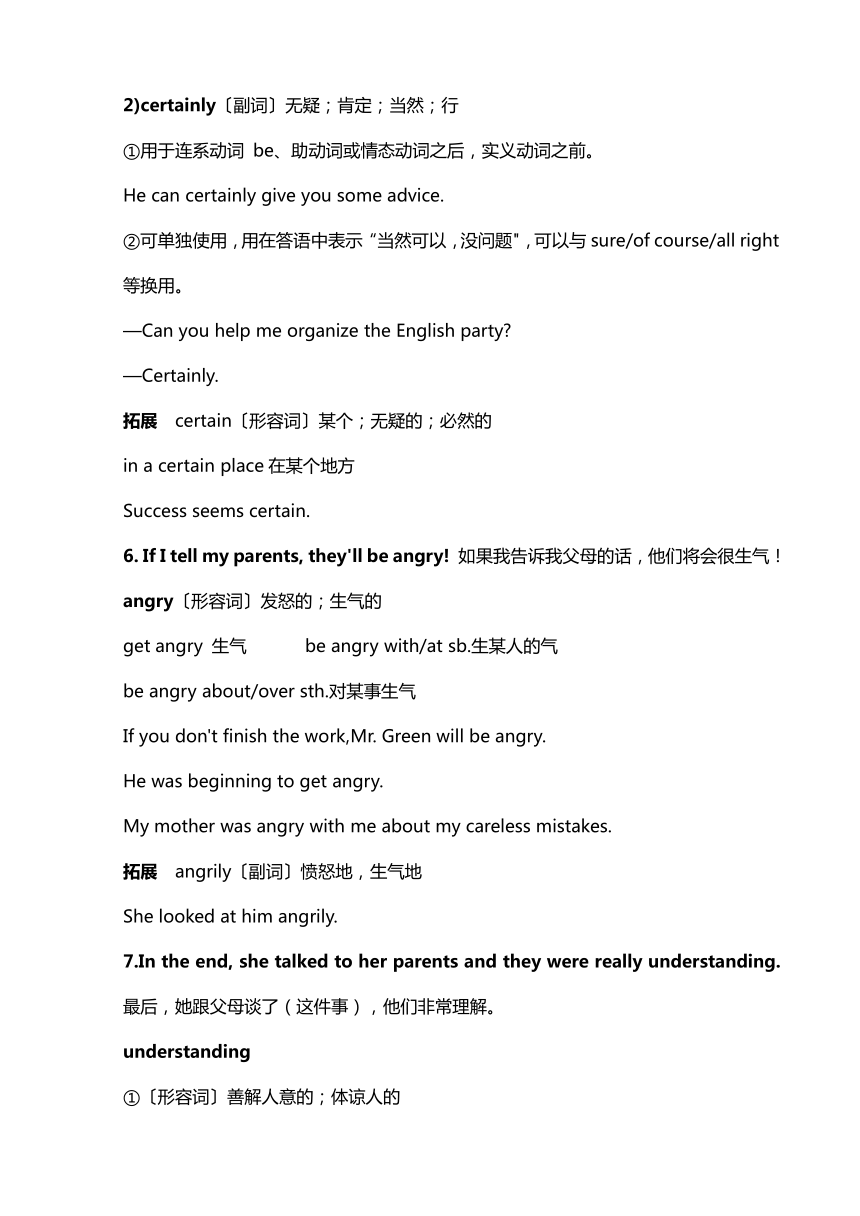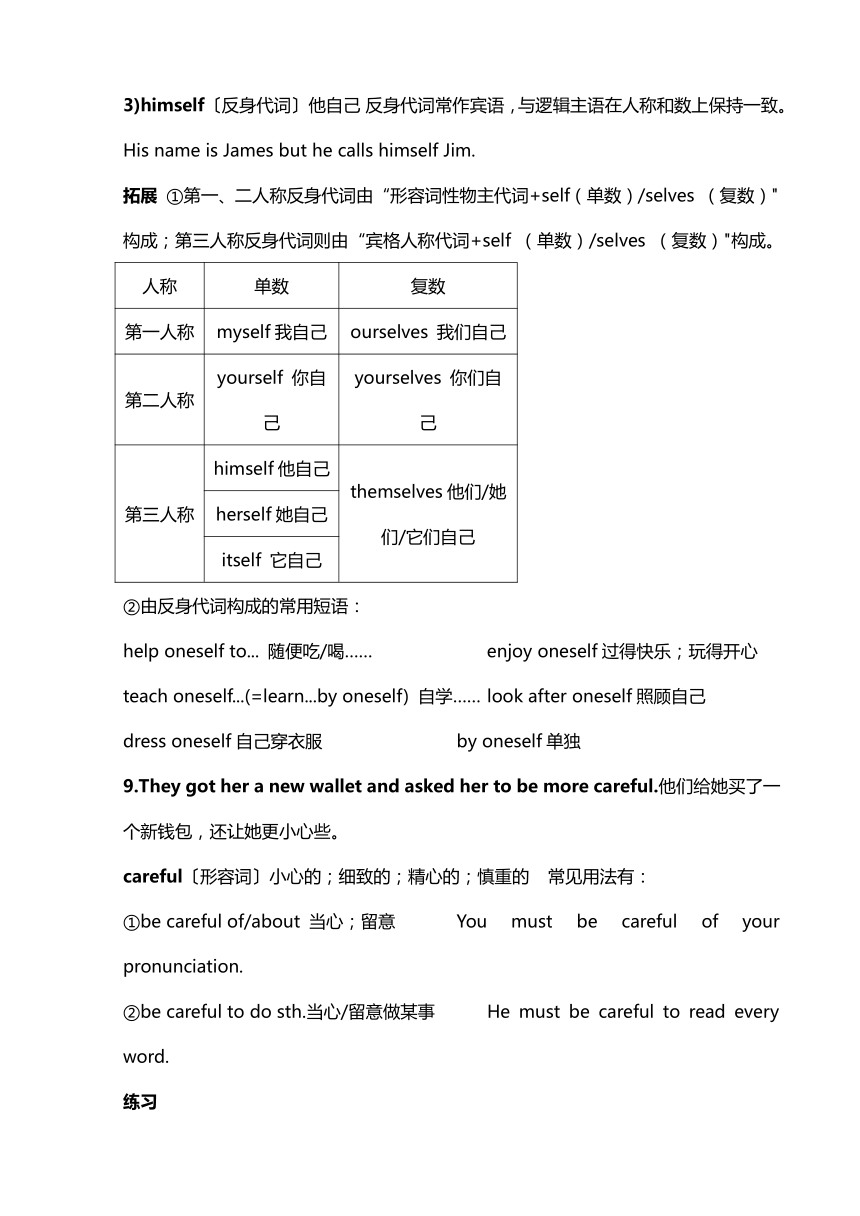Unit 10 If you go to the party, you'll have a great timeSectionB 知识点学案
文档属性
| 名称 | Unit 10 If you go to the party, you'll have a great timeSectionB 知识点学案 |  | |
| 格式 | docx | ||
| 文件大小 | 30.1KB | ||
| 资源类型 | 教案 | ||
| 版本资源 | 人教新目标(Go for it)版 | ||
| 科目 | 英语 | ||
| 更新时间 | 2023-07-09 21:45:34 | ||
图片预览





文档简介
Unit 10 If you go to the party, you'll have a great time!
Section B
1.travel around the world环游世界
travel
①〔动词〕旅行;游历
travel around/all over the world环游世界 travel to... 到……旅行
They want to travel across the desert.
We'd like to travel to Canada.
②〔名词〕旅行;游历
space travel 太空旅行 air travel 乘飞机旅行
③〔不及物动词〕行进;传播
Light travels faster than sound.
拓展 traveler〔可数名词〕旅行者 We met some interesting travelers in England.
助记 长途陆路用journey,短途短期用trip,观光巡演用tour,时长路远用travel。
2.If people have problems, they should keep them to themselves.如果人们有问题,他们应该绝口不提。
keep...to oneself 保守秘密;绝口不提;把问题/烦恼埋在心底
I promise to keep it to myself.
3.Sometimes they have problems with their schoolwork, and sometimes with their friends.有时他们有学业方面的问题,有时有朋友方面的问题。
have problems with 在……方面有问题
Some people have problems with their minds.
拓展 have problems/trouble/difficulty(in) doing sth.做某事有困难
He has problems/trouble/difficulty (in) sleeping.
4."Problems and worries are normal in life, “says Laura. "在生活中,问题和烦恼是正常的,"劳拉说。
normal
①〔形容词〕正常的;一般的 可在句中作表语或定语。
It's normal for the human mind to wander.
I'm just a normal doctor.
②〔名词〕常态;一般水平
The journey took longer time than normal.
拓展 normally〔副词〕正常地,通常
We normally plant trees in spring.
5.Unless we talk to someone, we'll certainly feel worse.我们如果不与人聊聊,肯定会感觉更糟。
1)unless〔连词〕除非;如果不 引导条件状语从句,相当于if...not...。
Unless he invites me, I won't go to his party. = If he doesn't invite me, I won't go to his party.
注意 当主句用一般将来时或是祈使句时,unless引导的从句常用一般现在时。
There will be more pollution unless people drive less.
Don't pour the water into the river unless you make sure it is clean enough.
练习
You won't fully experience the culture of a foreign country____________you go there in person.
A.because B.unless C.as soon as D.as long as
2)certainly〔副词〕无疑;肯定;当然;行
①用于连系动词 be、助动词或情态动词之后,实义动词之前。
He can certainly give you some advice.
②可单独使用,用在答语中表示“当然可以,没问题",可以与sure/of course/all right等换用。
—Can you help me organize the English party
—Certainly.
拓展 certain〔形容词〕某个;无疑的;必然的
in a certain place在某个地方
Success seems certain.
6. If I tell my parents, they'll be angry! 如果我告诉我父母的话,他们将会很生气!
angry〔形容词〕发怒的;生气的
get angry 生气 be angry with/at sb.生某人的气
be angry about/over sth.对某事生气
If you don't finish the work,Mr. Green will be angry.
He was beginning to get angry.
My mother was angry with me about my careless mistakes.
拓展 angrily〔副词〕愤怒地,生气地
She looked at him angrily.
7.In the end, she talked to her parents and they were really understanding.最后,她跟父母谈了(这件事),他们非常理解。
understanding
①〔形容词〕善解人意的;体谅人的
比较级为more understanding,最高级为most understanding。
Luckily, I have a very understanding boss.
②〔名词〕理解
Your understanding is the greatest help.
拓展 understand〔动词〕理解;明白
He is trying his best to understand her meaning.
8.Her dad said he sometimes made careless mistakes himself.她爸爸说,他自己有时也犯粗心的错误。
1)careless〔形容词〕粗心的;不小心的
反义词为careful,意为“小心的;细致的;精心的;慎重的”;副词形式是carelessly。
a careless driver一名粗心的司机
拓展 某些名词加后缀-less构成形容词,表示否定意义,意为“无……的;不……的”。
meaning+-less→meaningless(毫无意义的) help+-less→helpless(无助的)
home+-less→homeless(无家可归的) hope+-less→hopeless (无望的)
use+-less→useless (无用的)
2) mistake
①〔可数名词〕错误;失误
make mistakes/a mistake(in...)(在……方面)犯错误 by mistake 错误地;无意中
You should be more careful so that you won't make mistakes.
②〔及物动词〕弄错;误解 过去式是mistook
mistake...for... 错把……当作……
The teacher mistook me for my twin brother.
3)himself〔反身代词〕他自己 反身代词常作宾语,与逻辑主语在人称和数上保持一致。
His name is James but he calls himself Jim.
拓展 ①第一、二人称反身代词由“形容词性物主代词+self(单数)/selves (复数)"构成;第三人称反身代词则由“宾格人称代词+self (单数)/selves (复数)"构成。
人称 单数 复数
第一人称 myself我自己 ourselves 我们自己
第二人称 yourself 你自己 yourselves 你们自己
第三人称 himself他自己 themselves他们/她们/它们自己
herself她自己
itself 它自己
②由反身代词构成的常用短语:
help oneself to... 随便吃/喝…… enjoy oneself过得快乐;玩得开心
teach oneself...(=learn...by oneself) 自学…… look after oneself照顾自己
dress oneself自己穿衣服 by oneself单独
9.They got her a new wallet and asked her to be more careful.他们给她买了一个新钱包,还让她更小心些。
careful〔形容词〕小心的;细致的;精心的;慎重的 常见用法有:
①be careful of/about 当心;留意 You must be careful of your pronunciation.
②be careful to do sth.当心/留意做某事 He must be careful to read every word.
练习
Lily is a____________(细心)girl and she seldom makes mistakes at work.
10.Robert Hunt advises students about common problems.罗伯特·亨特就一些常见的问题给学生们提出建议。
advise〔动词〕劝告;建议 主要有以下用法:
①advise sb.about/on... 就……给某人忠告/建议
Mr. Brown advised us about the concert.
②advise sb.(not) to do sth.劝告某人(不要)做某事
Our teacher advised us to make weekly plans.
③advise doing sth.劝告/建议做某事
My father advised traveling to England.
④advise+ that从句 建议……
that从句用虚拟语气,谓语用“should+动词原形”,should可以省略。
Lily advised that we organize a welcome party for Miss Liu.
练习
—Miss Li, can you tell me how to improve my writing skills?
—Certainly. I advise you____________English every day.
A.to keep B.keeping C.kept D.keep
11. It is best not to run away from our problems. 最好不要逃避我们的问题。
1) It is best (not) to do sth. 最好(不)做某事 it为形式主语,动词不定式短语为真正的主语。此句式相当于"You'd better(not) do sth."。
It is best to speak English every day. =You'd better speak English every day.
2)run away from 逃避;回避
You can't run away from your responsibilities.
拓展 与run相关的常用短语:
run off跑掉 run after追赶 run out of用完;用光 run away 逃跑;出逃
12.We should always try to solve them.我们应该总是尽力去解决问题。
辨析:solve与answer
solve 解决;解答 常与problem搭配使用,表示解决问题,此问题难度较大
answer 回答;答复 常与question搭配使用,表示回答问题,此问题难度较小
But being angry can't solve problems.
Who can answer my question
13.He thinks the first step is to find someone you trust to talk to.他认为(解决问题的)第一步是找个你信任的人向其倾诉。
1)step〔可数名词〕步;步骤
step by step一步一步地 take a step 迈步;采取措施
Please move two steps.
Can you tell me the next step
2) trust
①〔动词〕相信;信任 常见用法有:
a.trust sb. (=believe in sb.)信任某人 I just don't trust(=believe in)him.
b.trust sb. (not) to do sth.相信某人(不)会做某事 You can trust me not to tell anyone.
c.trust sth.相信某事 He trusted her judgement.
②〔名词〕信任 If you put your trust in me, I will not let you down.
14. Students often forget that their parents have more experience... 学生们经常忘记他们的父母拥有更多的经验……
experience
①〔不可数名词〕经验 Mrs. Green has a lot of teaching experience.
②〔可数名词〕经历 Tom likes traveling. He has many unusual experiences.
③〔及物动词〕经历 Children need to experience things for themselves to learn.
练习
Miss Li has lots of teaching____________.She has her own ways to make classes lovely and
Interesting.
A.exercise B.excitement C.experience D.environment
15.In English, we say that sharing a problem is like cutting it in half.在英语中,我们说与人分担一个问题就像把问题分成两半。
1)动名词(短语)作主语 sharing a problem为动名词短语,在此作宾语从句的主语。 单个动名词(短语)作主语时,谓语动词用单数。
Helping others is helping ourselves.
2)in half 分成两半 相当于into halves。
Please cut the cake in half/into halves.
16.So you're halfway to solving a problem just by talking to someone about it!因此,你只要跟人聊聊这个问题,你就已经解决了问题的一半!
be halfway to... 完成了或做了某件事情的一半/部分
其中to是介词,后跟动词-ing形式。
We are halfway to finishing the job.
17.Who else can you get advice from?你还能从谁那儿得到建议?
辨析:else与other
else 副词 别的;其他的 修饰疑问代词、疑问副词或不定代词,置于这些词之后
other 形容词 其余的;另外的 修饰名词,置于名词之前
What else can you see in the room
Some people fear not knowing anyone else in the group.
What other things can you see in the room
知识梳理
用法集萃
1.plan to do sth.计划做某事 2.ask sb. (not)to do sth.要求某人(不要)做某事
3.too...to do sth.太……而不能做某事 4.tell sb.to do sth.告诉某人做某事
5. give sb.sth.= give sth.to sb.给某人某物
6.have enough...to do sth.有足够的……去做某事
7.be afraid to do sth.害怕做某事 8.advise sb.to do sth.建议某人做某事
advise doing sth.建议做某事 9.need to do sth.需要做某事
10.be halfway to doing sth.完成了或做了某件事情的一半/部分
11.keep doing sth.一直做某事
12. The worst/best/... (thing) is to do sth.最差的/最好的/……(事情)是做某事。
13.It's best(not)to do sth.最好(不)做某事。
14.The first step is to do sth.第一步是做某事。
15. trust sb.(not)to do sth.相信某人(不)会做某事
语法专项
一 if引导的条件状语从句
1.if意为“如果”,引导条件状语从句,既可放在主句前面,也可放在主句后面。若if条件句放在前面,从句后面要用逗号与主句隔开。
If you go there, I’ll go, too.
My mother will take me to the park if she is free.
2.时态运用
在含有 if引导的条件状语从句的主从复合句中,主句有下列情况之一时,从句要用一般现在时表示将来意义。
(1)主句是一般将来时。
从句 主句
If he comes, he will bring his violin.
一般现在时 一般将来时
(2)主句谓语含有情态动词may/might/can/must/should等。
从句 主句
If we start now, we can finish the work on time.
一般现在时 情态动词
(3)主句是祈使句。
主句 从句
Work hard if you want to get good grades.
祈使句 一般现在时
3.句型转换
(1)借助“祈使句+and/or+句子(一般将来时)"这一句型来转换。其中,在句意上and表示顺承;or 表示转折,意为“否则”。
If you study hard, you'll pass the exam easily. = Study hard and you'll pass the exam easily.
If you are not careful, you'll make more mistakes. = Be careful, or you'll make more mistakes.
(2)借助without或with来转换条件状语从句。
If there is no water, fish will die. =Fish will die without water.
If you help me, I'll finish the work soon. =With your help, I'll finish the work soon.
助记 if引导的条件状语从句
(if)条件句,放在前,逗号要放主句前;(if)条件句,表条件,主将从现是关键。
练习
____________you can use your dictionary, you will learn English better.
A.If B.Unless C.Though D.Before
二 should 的用法
1.用法
should为情态动词,意为“应该;应当”,后接动词原形,无人称和数的变化。常用来表示征询意见、建议、劝告、要求和义务等。
(1)should表示劝告或建议,也可用于征求建议,意为“应该”。
You should stop playing computer games.
What should I do
(2)should表示要求或命令。
You shouldn't fight with your classmate.
(3)should表示预测或可能。
His schoolbag should be in the classroom.
(4)should有时表示说话人的感情,如惊讶、愤怒、失望等。
Why should I go
2.基本句式
肯定句 Sb. should+动词原形+其他. Maybe he should say sorry.
否定句 Sb. shouldn't+动词原形+其他. You shouldn't smoke in the hospital.
一般疑问句及其回答 —Should sb.+动词原形+其他? —Yes, sb.should./No,sb.shouldn't. —Should you come here tonight —Yes, I should.
助记 情态动词should的用法
表示劝告与建议,也表义务与责任;第一人称问句中,征询意见要记清。
练习
People____________talk on a mobile phone while they are driving.
A.shouldn't B.needn't C.must D.can
语法专练
I. 单项填空
1. You need to practice speaking every day____________you hope to improve your spoken English.
A.if B.although C.unless D.until
2. If Tom____________the game, we'll give him a surprise.
A.win B. wins C.won D.winning
3. As a teenager, you____________help your parents do some housework.
A.shall B.will C.should D.must
4. For your health, you____________watch TV too much or play computer games for too long.
A.couldn't B.shouldn't C.could D.should
Ⅱ.按要求完成句子
5. You can't borrow books from the library without a membership card.(改为复合句)
You can't borrow books from the library____________you____________have a membership card.
6.如果汤姆下周来,我将带他在我们城市转一转。(完成译句)
____________Tom____________next week, I will show him around our city.
Section B
1.travel around the world环游世界
travel
①〔动词〕旅行;游历
travel around/all over the world环游世界 travel to... 到……旅行
They want to travel across the desert.
We'd like to travel to Canada.
②〔名词〕旅行;游历
space travel 太空旅行 air travel 乘飞机旅行
③〔不及物动词〕行进;传播
Light travels faster than sound.
拓展 traveler〔可数名词〕旅行者 We met some interesting travelers in England.
助记 长途陆路用journey,短途短期用trip,观光巡演用tour,时长路远用travel。
2.If people have problems, they should keep them to themselves.如果人们有问题,他们应该绝口不提。
keep...to oneself 保守秘密;绝口不提;把问题/烦恼埋在心底
I promise to keep it to myself.
3.Sometimes they have problems with their schoolwork, and sometimes with their friends.有时他们有学业方面的问题,有时有朋友方面的问题。
have problems with 在……方面有问题
Some people have problems with their minds.
拓展 have problems/trouble/difficulty(in) doing sth.做某事有困难
He has problems/trouble/difficulty (in) sleeping.
4."Problems and worries are normal in life, “says Laura. "在生活中,问题和烦恼是正常的,"劳拉说。
normal
①〔形容词〕正常的;一般的 可在句中作表语或定语。
It's normal for the human mind to wander.
I'm just a normal doctor.
②〔名词〕常态;一般水平
The journey took longer time than normal.
拓展 normally〔副词〕正常地,通常
We normally plant trees in spring.
5.Unless we talk to someone, we'll certainly feel worse.我们如果不与人聊聊,肯定会感觉更糟。
1)unless〔连词〕除非;如果不 引导条件状语从句,相当于if...not...。
Unless he invites me, I won't go to his party. = If he doesn't invite me, I won't go to his party.
注意 当主句用一般将来时或是祈使句时,unless引导的从句常用一般现在时。
There will be more pollution unless people drive less.
Don't pour the water into the river unless you make sure it is clean enough.
练习
You won't fully experience the culture of a foreign country____________you go there in person.
A.because B.unless C.as soon as D.as long as
2)certainly〔副词〕无疑;肯定;当然;行
①用于连系动词 be、助动词或情态动词之后,实义动词之前。
He can certainly give you some advice.
②可单独使用,用在答语中表示“当然可以,没问题",可以与sure/of course/all right等换用。
—Can you help me organize the English party
—Certainly.
拓展 certain〔形容词〕某个;无疑的;必然的
in a certain place在某个地方
Success seems certain.
6. If I tell my parents, they'll be angry! 如果我告诉我父母的话,他们将会很生气!
angry〔形容词〕发怒的;生气的
get angry 生气 be angry with/at sb.生某人的气
be angry about/over sth.对某事生气
If you don't finish the work,Mr. Green will be angry.
He was beginning to get angry.
My mother was angry with me about my careless mistakes.
拓展 angrily〔副词〕愤怒地,生气地
She looked at him angrily.
7.In the end, she talked to her parents and they were really understanding.最后,她跟父母谈了(这件事),他们非常理解。
understanding
①〔形容词〕善解人意的;体谅人的
比较级为more understanding,最高级为most understanding。
Luckily, I have a very understanding boss.
②〔名词〕理解
Your understanding is the greatest help.
拓展 understand〔动词〕理解;明白
He is trying his best to understand her meaning.
8.Her dad said he sometimes made careless mistakes himself.她爸爸说,他自己有时也犯粗心的错误。
1)careless〔形容词〕粗心的;不小心的
反义词为careful,意为“小心的;细致的;精心的;慎重的”;副词形式是carelessly。
a careless driver一名粗心的司机
拓展 某些名词加后缀-less构成形容词,表示否定意义,意为“无……的;不……的”。
meaning+-less→meaningless(毫无意义的) help+-less→helpless(无助的)
home+-less→homeless(无家可归的) hope+-less→hopeless (无望的)
use+-less→useless (无用的)
2) mistake
①〔可数名词〕错误;失误
make mistakes/a mistake(in...)(在……方面)犯错误 by mistake 错误地;无意中
You should be more careful so that you won't make mistakes.
②〔及物动词〕弄错;误解 过去式是mistook
mistake...for... 错把……当作……
The teacher mistook me for my twin brother.
3)himself〔反身代词〕他自己 反身代词常作宾语,与逻辑主语在人称和数上保持一致。
His name is James but he calls himself Jim.
拓展 ①第一、二人称反身代词由“形容词性物主代词+self(单数)/selves (复数)"构成;第三人称反身代词则由“宾格人称代词+self (单数)/selves (复数)"构成。
人称 单数 复数
第一人称 myself我自己 ourselves 我们自己
第二人称 yourself 你自己 yourselves 你们自己
第三人称 himself他自己 themselves他们/她们/它们自己
herself她自己
itself 它自己
②由反身代词构成的常用短语:
help oneself to... 随便吃/喝…… enjoy oneself过得快乐;玩得开心
teach oneself...(=learn...by oneself) 自学…… look after oneself照顾自己
dress oneself自己穿衣服 by oneself单独
9.They got her a new wallet and asked her to be more careful.他们给她买了一个新钱包,还让她更小心些。
careful〔形容词〕小心的;细致的;精心的;慎重的 常见用法有:
①be careful of/about 当心;留意 You must be careful of your pronunciation.
②be careful to do sth.当心/留意做某事 He must be careful to read every word.
练习
Lily is a____________(细心)girl and she seldom makes mistakes at work.
10.Robert Hunt advises students about common problems.罗伯特·亨特就一些常见的问题给学生们提出建议。
advise〔动词〕劝告;建议 主要有以下用法:
①advise sb.about/on... 就……给某人忠告/建议
Mr. Brown advised us about the concert.
②advise sb.(not) to do sth.劝告某人(不要)做某事
Our teacher advised us to make weekly plans.
③advise doing sth.劝告/建议做某事
My father advised traveling to England.
④advise+ that从句 建议……
that从句用虚拟语气,谓语用“should+动词原形”,should可以省略。
Lily advised that we organize a welcome party for Miss Liu.
练习
—Miss Li, can you tell me how to improve my writing skills?
—Certainly. I advise you____________English every day.
A.to keep B.keeping C.kept D.keep
11. It is best not to run away from our problems. 最好不要逃避我们的问题。
1) It is best (not) to do sth. 最好(不)做某事 it为形式主语,动词不定式短语为真正的主语。此句式相当于"You'd better(not) do sth."。
It is best to speak English every day. =You'd better speak English every day.
2)run away from 逃避;回避
You can't run away from your responsibilities.
拓展 与run相关的常用短语:
run off跑掉 run after追赶 run out of用完;用光 run away 逃跑;出逃
12.We should always try to solve them.我们应该总是尽力去解决问题。
辨析:solve与answer
solve 解决;解答 常与problem搭配使用,表示解决问题,此问题难度较大
answer 回答;答复 常与question搭配使用,表示回答问题,此问题难度较小
But being angry can't solve problems.
Who can answer my question
13.He thinks the first step is to find someone you trust to talk to.他认为(解决问题的)第一步是找个你信任的人向其倾诉。
1)step〔可数名词〕步;步骤
step by step一步一步地 take a step 迈步;采取措施
Please move two steps.
Can you tell me the next step
2) trust
①〔动词〕相信;信任 常见用法有:
a.trust sb. (=believe in sb.)信任某人 I just don't trust(=believe in)him.
b.trust sb. (not) to do sth.相信某人(不)会做某事 You can trust me not to tell anyone.
c.trust sth.相信某事 He trusted her judgement.
②〔名词〕信任 If you put your trust in me, I will not let you down.
14. Students often forget that their parents have more experience... 学生们经常忘记他们的父母拥有更多的经验……
experience
①〔不可数名词〕经验 Mrs. Green has a lot of teaching experience.
②〔可数名词〕经历 Tom likes traveling. He has many unusual experiences.
③〔及物动词〕经历 Children need to experience things for themselves to learn.
练习
Miss Li has lots of teaching____________.She has her own ways to make classes lovely and
Interesting.
A.exercise B.excitement C.experience D.environment
15.In English, we say that sharing a problem is like cutting it in half.在英语中,我们说与人分担一个问题就像把问题分成两半。
1)动名词(短语)作主语 sharing a problem为动名词短语,在此作宾语从句的主语。 单个动名词(短语)作主语时,谓语动词用单数。
Helping others is helping ourselves.
2)in half 分成两半 相当于into halves。
Please cut the cake in half/into halves.
16.So you're halfway to solving a problem just by talking to someone about it!因此,你只要跟人聊聊这个问题,你就已经解决了问题的一半!
be halfway to... 完成了或做了某件事情的一半/部分
其中to是介词,后跟动词-ing形式。
We are halfway to finishing the job.
17.Who else can you get advice from?你还能从谁那儿得到建议?
辨析:else与other
else 副词 别的;其他的 修饰疑问代词、疑问副词或不定代词,置于这些词之后
other 形容词 其余的;另外的 修饰名词,置于名词之前
What else can you see in the room
Some people fear not knowing anyone else in the group.
What other things can you see in the room
知识梳理
用法集萃
1.plan to do sth.计划做某事 2.ask sb. (not)to do sth.要求某人(不要)做某事
3.too...to do sth.太……而不能做某事 4.tell sb.to do sth.告诉某人做某事
5. give sb.sth.= give sth.to sb.给某人某物
6.have enough...to do sth.有足够的……去做某事
7.be afraid to do sth.害怕做某事 8.advise sb.to do sth.建议某人做某事
advise doing sth.建议做某事 9.need to do sth.需要做某事
10.be halfway to doing sth.完成了或做了某件事情的一半/部分
11.keep doing sth.一直做某事
12. The worst/best/... (thing) is to do sth.最差的/最好的/……(事情)是做某事。
13.It's best(not)to do sth.最好(不)做某事。
14.The first step is to do sth.第一步是做某事。
15. trust sb.(not)to do sth.相信某人(不)会做某事
语法专项
一 if引导的条件状语从句
1.if意为“如果”,引导条件状语从句,既可放在主句前面,也可放在主句后面。若if条件句放在前面,从句后面要用逗号与主句隔开。
If you go there, I’ll go, too.
My mother will take me to the park if she is free.
2.时态运用
在含有 if引导的条件状语从句的主从复合句中,主句有下列情况之一时,从句要用一般现在时表示将来意义。
(1)主句是一般将来时。
从句 主句
If he comes, he will bring his violin.
一般现在时 一般将来时
(2)主句谓语含有情态动词may/might/can/must/should等。
从句 主句
If we start now, we can finish the work on time.
一般现在时 情态动词
(3)主句是祈使句。
主句 从句
Work hard if you want to get good grades.
祈使句 一般现在时
3.句型转换
(1)借助“祈使句+and/or+句子(一般将来时)"这一句型来转换。其中,在句意上and表示顺承;or 表示转折,意为“否则”。
If you study hard, you'll pass the exam easily. = Study hard and you'll pass the exam easily.
If you are not careful, you'll make more mistakes. = Be careful, or you'll make more mistakes.
(2)借助without或with来转换条件状语从句。
If there is no water, fish will die. =Fish will die without water.
If you help me, I'll finish the work soon. =With your help, I'll finish the work soon.
助记 if引导的条件状语从句
(if)条件句,放在前,逗号要放主句前;(if)条件句,表条件,主将从现是关键。
练习
____________you can use your dictionary, you will learn English better.
A.If B.Unless C.Though D.Before
二 should 的用法
1.用法
should为情态动词,意为“应该;应当”,后接动词原形,无人称和数的变化。常用来表示征询意见、建议、劝告、要求和义务等。
(1)should表示劝告或建议,也可用于征求建议,意为“应该”。
You should stop playing computer games.
What should I do
(2)should表示要求或命令。
You shouldn't fight with your classmate.
(3)should表示预测或可能。
His schoolbag should be in the classroom.
(4)should有时表示说话人的感情,如惊讶、愤怒、失望等。
Why should I go
2.基本句式
肯定句 Sb. should+动词原形+其他. Maybe he should say sorry.
否定句 Sb. shouldn't+动词原形+其他. You shouldn't smoke in the hospital.
一般疑问句及其回答 —Should sb.+动词原形+其他? —Yes, sb.should./No,sb.shouldn't. —Should you come here tonight —Yes, I should.
助记 情态动词should的用法
表示劝告与建议,也表义务与责任;第一人称问句中,征询意见要记清。
练习
People____________talk on a mobile phone while they are driving.
A.shouldn't B.needn't C.must D.can
语法专练
I. 单项填空
1. You need to practice speaking every day____________you hope to improve your spoken English.
A.if B.although C.unless D.until
2. If Tom____________the game, we'll give him a surprise.
A.win B. wins C.won D.winning
3. As a teenager, you____________help your parents do some housework.
A.shall B.will C.should D.must
4. For your health, you____________watch TV too much or play computer games for too long.
A.couldn't B.shouldn't C.could D.should
Ⅱ.按要求完成句子
5. You can't borrow books from the library without a membership card.(改为复合句)
You can't borrow books from the library____________you____________have a membership card.
6.如果汤姆下周来,我将带他在我们城市转一转。(完成译句)
____________Tom____________next week, I will show him around our city.
同课章节目录
- Unit 1 Where did you go on vacation?
- Section A
- Section B
- Unit 2 How often do you exercise?
- Section A
- Section B
- Unit 3 I'm more outgoing than my sister.
- Section A
- Section B
- Unit 4 What's the best movie theater?
- Section A
- Section B
- Unit 5 Do you want to watch a game show?
- Section A
- Section B
- Unit 6 I'm going to study computer science.
- Section A
- Section B
- Unit 7 Will people have robots?
- Section A
- Section B
- Unit 8 How do you make a banana milk shake?
- Section A
- Section B
- Unit 9 Can you come to my party?
- Section A
- Section B
- Unit 10 If you go to the party, you'll have a grea
- Section A
- Section B
